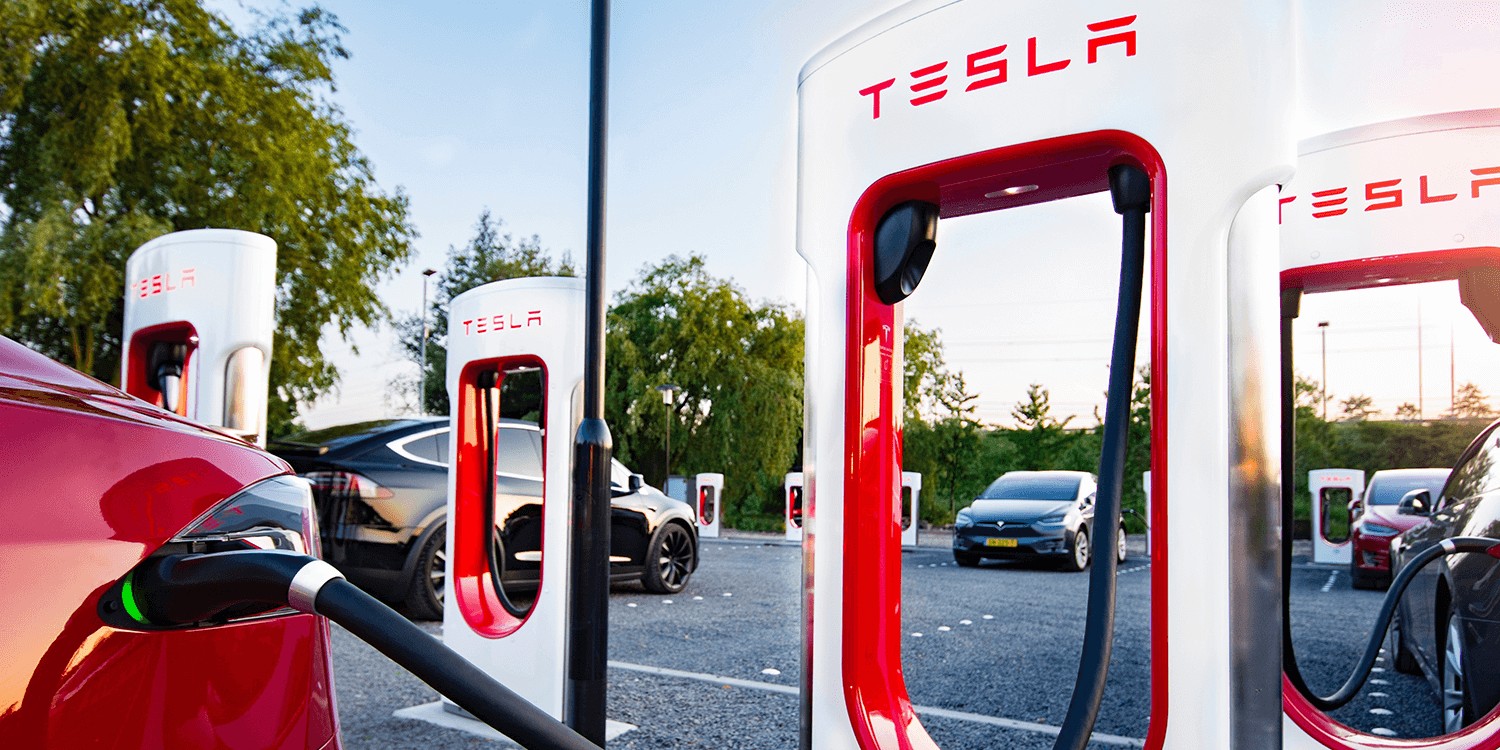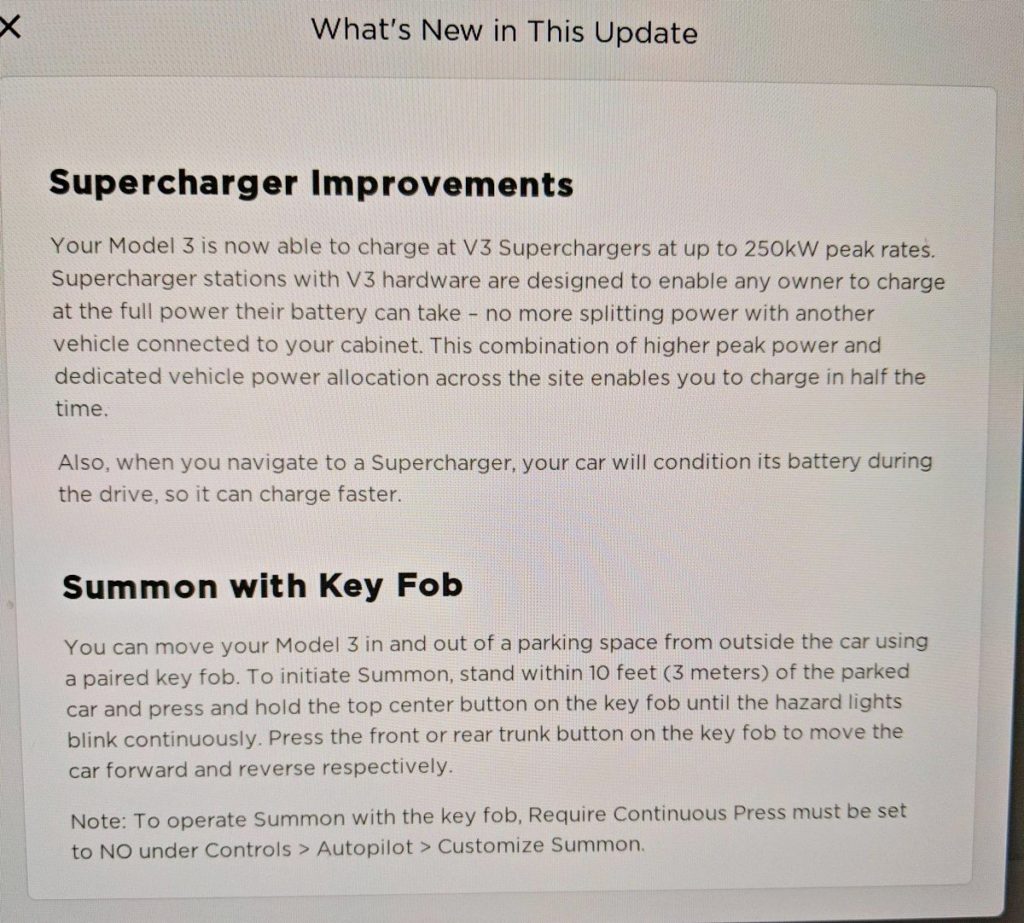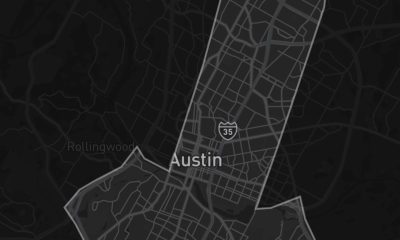

News
Tesla Supercharger V3 details: 250 kW, no charge splitting, twice as fast
Tesla launched its newest V3 Supercharger at an official unveiling event in Fremont, California, Wednesday night.
As we first reported, V3 Superchargers will be able to charge twice as fast the current generation Supercharger with a maximum power output of 250 kW or 1,000 miles per hour. Additionally, Tesla owners using V3 Superchargers will no longer need to split power with neighboring vehicles, thereby substantially increasing the charge rate and reducing the overall amount of charging time by nearly half.
Supercharger V3 details first surfaced Wednesday evening in Release Notes for a new over-the-air firmware update that went out to Model 3 owners, first captured by Erik @teslainventory on Twitter.
Tesla began to roll out the over-the-air firmware update to a small group of Model 3 owners that were invited to attend the official Supercharger V3 unveiling. Attendees are members of Tesla’s “Early Access Program” who will be one of the first to use Tesla’s next-generation Supercharger.
The firmware update went out ahead of the event to prepare these vehicles to accept the higher power output from Tesla’s newest ultra-fast chargers.
“Your Model 3 is now able to charge at V3 Superchargers at up to 250 kW peak rates. Supercharger stations with V3 hardware are designed to enable 
Of note is the final sentence in the section for “Supercharger Improvements”, which indicates that the firmware update will allow a vehicle to condition its batteries before arriving at a V3 Supercharger station. “Also, when you navigate to a Supercharger, your call will condition its battery during the drive, so it can charge faster,” reads the release note.
Preconditioning a battery isn’t something new for Tesla vehicles, especially for P100D owners looking to ‘Bring it on!‘ with Ludicrous Mode. Being able to optimize the temperature of the battery cells allows them to be in a state that can operate at higher current and thereby charge at the higher 250 kW power.
At the moment, our understanding is that only Model 3, which utilizes a newer generation 2170 cell compared to the older 18650 form factor cell found in Model S and Model X, will be able to V3 Supercharge at full potential.
Be sure to check back as we will update the story with full details and specifications for Tesla Supercharger V3.
Update: Tesla published details for V3 Supercharging in a company blog post (included below). A video of the fast charging speed can be seen in their video.
Introducing V3 Supercharging
Tesla has more than 12,000 Superchargers across North America, Europe, and Asia and our network continues to grow daily: more than 99% of the U.S. population is covered by the network, and we anticipate similar coverage in Europe by the end of 2019. Recently, we passed 90% population coverage in China and are growing that number quickly. However, in order to drive continued electric vehicle adoption and further accelerate the world’s transition to sustainable energy, charging needs to be even faster, and the number of vehicles able to charge at a location in a day needs to be significantly higher. Today, we’re unveiling V3 Supercharging, the next step in the growth of Tesla’s Supercharger network. V3, which is born from our experience building the world’s largest grid-connected batteries, enables our vehicles to charge faster than any other electric vehicle on the market today.
Faster Charging, No More Power Sharing
V3 is a completely new architecture for Supercharging. A new 1MW power cabinet with a similar design to our utility-scale products supports peak rates of up to 250kW per car. At this rate, a Model 3 Long Range operating at peak efficiency can recover up to 75 miles of charge in 5 minutes and charge at rates of up to 1,000 miles per hour. Combined with other improvements we’re announcing today, V3 Supercharging will ultimately cut the amount of time customers spend charging by an average of 50%, as modeled on our fleet data.
Supercharger stations with V3’s new power electronics are designed to enable any owner to charge at the full power their battery can take – no more splitting power with a vehicle in the stall next to you. With these significant technical improvements, we anticipate the typical charging time at a V3 Supercharger will drop to around 15 minutes.
On-Route Battery Warmup
New Supercharging infrastructure isn’t the only way we are improving our customers’ charging experience. Beginning this week, Tesla is rolling out a new feature called On-Route Battery Warmup. Now, whenever you navigate to a Supercharger station, your vehicle will intelligently heat the battery to ensure you arrive at the optimal temperature to charge, reducing average charge times for owners by 25%.
This combination of higher peak power with V3, dedicated vehicle power allocation across Supercharger sites, and On-Route Battery Warmup 
With Model 3 now shipping globally in high volumes and Model Y on the way, V3 Supercharging enables us to deliver the fastest production charging experience at an unprecedented scale compared to other electric vehicle manufacturers. By increasing the number of vehicles we’re able to charge at each Supercharger in a day, the investment we’re making in our network will go significantly further with every V3 station deployed. Paired with other savings, these efficiencies will translate to an increased pace of investment for Superchargers moving forward, with a continued focus on getting to 100% ownership coverage across all regions we operate. With thousands of new Superchargers coming online in 2019, the launch of V3, and other changes we’re making to improve throughput, the Supercharger network will be able to serve more than 2x more vehicles per day at the end of 2019 compared with today – easily keeping pace with our 2019 fleet growth.
Beginning today, we’re opening the first public beta site in the Bay Area, which will incrementally be made available to owners in Tesla’s Early Access Program. We’re launching V3 Supercharging for Model 3, our highest volume vehicle, and we’ll continue to expand access as we review and assess the results of millions of charging events. We will increase Model S and X charging speeds via software updates in the coming months. V3 Supercharging will roll out to the wider fleet in an over the air firmware update to all owners in Q2 as more V3 Superchargers come online. Our first non-beta V3 Supercharger site will break ground next month, with North American sites ramping in Q2 and Q3 before coming to Europe and Asia-Pacific in Q4.
News
Tesla launches in India with Model Y, showing pricing will be biggest challenge
Tesla finally got its Model Y launched in India, but it will surely come at a price for consumers.

Tesla has officially launched in India following years of delays, as it brought its Model Y to the market for the first time on Tuesday.
However, the launch showed that pricing is going to be its biggest challenge. The all-electric Model Y is priced significantly higher than in other major markets in which Tesla operates.
On Tuesday, Tesla’s Model Y went up for sale for 59,89,000 rupees for the Rear-Wheel Drive configuration, while the Long Range Rear-Wheel Drive was priced at 67,89,000.
This equates to $69,686 for the RWD and $78,994 for the Long Range RWD, a substantial markup compared to what these cars sell for in the United States.
🚨 Here’s the difference in price for the Tesla Model Y in the U.S. compared to India.
🚨 59,89,000 is $69,686
🚨 67,89,000 is $78,994 pic.twitter.com/7EUzyWLcED— TESLARATI (@Teslarati) July 15, 2025
Deliveries are currently scheduled for the third quarter, and it will be interesting to see how many units they can sell in the market at this price point.
The price includes tariffs and additional fees that are applied by the Indian government, which has aimed to work with foreign automakers to come to terms on lower duties that increase vehicle cost.
Tesla Model Y seen testing under wraps in India ahead of launch
There is a chance that these duties will be removed, which would create a more stable and affordable pricing model for Tesla in the future. President Trump and Indian Prime Minister Narendra Modi continue to iron out those details.
Maharashtra Chief Minister Devendra Fadnavis said to reporters outside the company’s new outlet in the region (via Reuters):
“In the future, we wish to see R&D and manufacturing done in India, and I am sure at an appropriate stage, Tesla will think about it.”
It appears to be eerily similar to the same “game of chicken” Tesla played with Indian government officials for the past few years. Tesla has always wanted to enter India, but was unable to do so due to these import duties.
India wanted Tesla to commit to building a Gigafactory in the country, but Tesla wanted to test demand first.
It seems this could be that demand test, and the duties are going to have a significant impact on what demand will actually be.
Elon Musk
Tesla ups Robotaxi fare price to another comical figure with service area expansion
Tesla upped its fare price for a Robotaxi ride from $4.20 to, you guessed it, $6.90.

Tesla has upped its fare price for the Robotaxi platform in Austin for the first time since its launch on June 22. The increase came on the same day that Tesla expanded its Service Area for the Robotaxi ride-hailing service, offering rides to a broader portion of the city.
The price is up from $4.20, a figure that many Tesla fans will find amusing, considering CEO Elon Musk has used that number, as well as ’69,’ as a light-hearted attempt at comedy over the past several years.
Musk confirmed yesterday that Tesla would up the price per ride from that $4.20 point to $6.90. Are we really surprised that is what the company decided on, as the expansion of the Service Area also took effect on Monday?
But the price is now a princely $6.90, as foretold in the prophecy 😂
— Elon Musk (@elonmusk) July 14, 2025
The Service Area expansion was also somewhat of a joke too, especially considering the shape of the new region where the driverless service can travel.
I wrote yesterday about how it might be funny, but in reality, it is more of a message to competitors that Tesla can expand in Austin wherever it wants at any time.
Tesla’s Robotaxi expansion wasn’t a joke, it was a warning to competitors
It was only a matter of time before the Robotaxi platform would subject riders to a higher, flat fee for a ride. This is primarily due to two reasons: the size of the access program is increasing, and, more importantly, the service area is expanding in size.
Tesla has already surpassed Waymo in Austin in terms of its service area, which is roughly five square miles larger. Waymo launched driverless rides to the public back in March, while Tesla’s just became available to a small group in June. Tesla has already expanded it, allowing new members to hail a ride from a driverless Model Y nearly every day.
The Robotaxi app is also becoming more robust as Tesla is adding new features with updates. It has already been updated on two occasions, with the most recent improvements being rolled out yesterday.
Tesla updates Robotaxi app with several big changes, including wider service area
News
Tesla Model Y and Model 3 dominate U.S. EV sales despite headwinds
Tesla’s two mainstream vehicles accounted for more than 40% of all EVs sold in the United States in Q2 2025.

Tesla’s Model Y and Model 3 remained the top-selling electric vehicles in the U.S. during Q2 2025, even as the broader EV market dipped 6.3% year-over-year.
The Model Y logged 86,120 units sold, followed by the Model 3 at 48,803. This means that Tesla’s two mainstream vehicles accounted for 43% of all EVs sold in the United States during the second quarter, as per data from Cox Automotive.
Tesla leads amid tax credit uncertainty and a tough first half
Tesla’s performance in Q2 is notable given a series of hurdles earlier in the year. The company temporarily paused Model Y deliveries in Q1 as it transitioned to the production of the new Model Y, and its retail presence was hit by protests and vandalism tied to political backlash against CEO Elon Musk. The fallout carried into Q2, yet Tesla’s two mass-market vehicles still outsold the next eight EVs combined.
Q2 marked just the third-ever YoY decline in quarterly EV sales, totaling 310,839 units. Electric vehicle sales, however, were still up 4.9% from Q1 and reached a record 607,089 units in the first half of 2025. Analysts also expect a surge in Q3 as buyers rush to qualify for federal EV tax credits before they expire on October 1, Cox Automotive noted in a post.
Legacy rivals gain ground, but Tesla holds its commanding lead
General Motors more than doubled its EV volume in the first half of 2025, selling over 78,000 units and boosting its EV market share to 12.9%. Chevrolet became the second-best-selling EV brand, pushing GM past Ford and Hyundai. Tesla, however, still retained a commanding 44.7% electric vehicle market share despite a 12% drop in in Q2 revenue, following a decline of almost 9% in Q1.
Incentives reached record highs in Q2, averaging 14.8% of transaction prices, roughly $8,500 per vehicle. As government support winds down, the used EV market is also gaining momentum, with over 100,000 used EVs sold in Q2.
Q2 2025 Kelley Blue Book EV Sales Report by Simon Alvarez on Scribd
-

 Elon Musk2 weeks ago
Elon Musk2 weeks agoTesla investors will be shocked by Jim Cramer’s latest assessment
-

 News3 days ago
News3 days agoTesla debuts hands-free Grok AI with update 2025.26: What you need to know
-

 Elon Musk1 week ago
Elon Musk1 week agoElon Musk confirms Grok 4 launch on July 9 with livestream event
-

 Elon Musk5 days ago
Elon Musk5 days agoxAI launches Grok 4 with new $300/month SuperGrok Heavy subscription
-

 News2 weeks ago
News2 weeks agoTesla Model 3 ranks as the safest new car in Europe for 2025, per Euro NCAP tests
-

 Elon Musk2 weeks ago
Elon Musk2 weeks agoxAI’s Memphis data center receives air permit despite community criticism
-

 News5 days ago
News5 days agoTesla begins Robotaxi certification push in Arizona: report
-

 Elon Musk2 weeks ago
Elon Musk2 weeks agoTesla scrambles after Musk sidekick exit, CEO takes over sales












